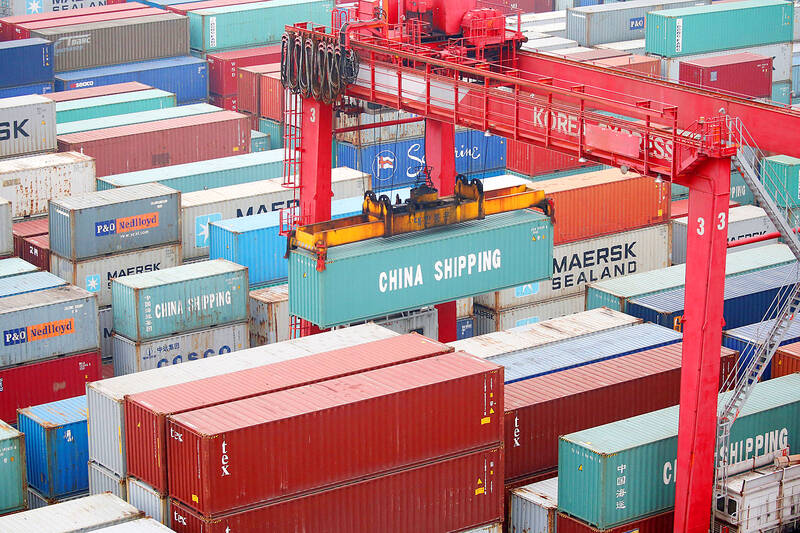South Korea’s exports maintained growth momentum last month as demand from China increased and semiconductor sales stayed resilient.
The value of shipments adjusted for working-day differences increased 4.3 percent from a year earlier last month, according to data released yesterday by the South Korean Ministry of Trade, Industry and Energy. That compared with a 3.7 percent rise initially reported for the full month of November.
Unadjusted exports rose 6.6 percent while overall imports increased by 3.3 percent, resulting in a trade surplus of US$6.5 billion.

Photo: Reuters
The up-tick offers some solace for a nation undergoing its biggest political upheaval in years. South Korean President Yoon Suk-yeol was impeached after shocking the nation by briefly declaring martial law on Dec. 3. South Korean Prime Minister Han Duck-soo was also impeached for refusing to quickly appoint judges to deliberate on Yoon’s impeachment. South Korean Minister of Finance Choi Sang-mok has stepped in as the second acting president.
The turmoil has sent the won to its lowest level since 2009, while South Korea’s stock markets also remain fragile. A Jeju Air plane crash on Sunday that killed all but two of 181 people on board might further dent consumer sentiment.
South Korea, which relies heavily on exports to drive its economic growth, also faces external challenges. US president-elect Donald Trump has promised an array of protectionist policies, including universal tariffs, as he prepares to return to the White House.
Bank of Korea Governor Rhee Chang-yong sees the economy growing this year less than the 1.9 percent forecast previously, and economists increasingly expect the central bank would go ahead with another cut this month as consumer and business confidence slump.
Weaker export momentum poses a threat to the won, and the nation’s semiconductor industry might experience slower demand this year after enjoying a boom from artificial intelligence development.
Chip exports increased 31.5 percent from a year earlier last month while shipments of cars fell 5.3 percent. Sales of wireless communication devices rose 16.1 percent, the trade ministry said.
Exports to China increased 8.6 percent, reversing from a contraction a month earlier, the ministry said. Shipments to the US rose 5.5 percent and exports to the EU advanced 15.1 percent.
For the year as a whole, South Korea’s exports rose 8.2 percent last year from a year earlier, the ministry said, adding that the trade surplus amounted to US$51.8 billion. Semiconductors, the biggest driver of exports, sold 43.9 percent more than in 2023, it said.
The outlook for this year is less bright. Exports are likely to grow 2.2 percent from a year earlier, while the trade surplus is set to reduce to US$48.7 billion, the Korea Development Institute said in a November forecast.

NEW IDENTITY: Known for its software, India has expanded into hardware, with its semiconductor industry growing from US$38bn in 2023 to US$45bn to US$50bn India on Saturday inaugurated its first semiconductor assembly and test facility, a milestone in the government’s push to reduce dependence on foreign chipmakers and stake a claim in a sector dominated by China. Indian Prime Minister Narendra Modi opened US firm Micron Technology Inc’s semiconductor assembly, test and packaging unit in his home state of Gujarat, hailing the “dawn of a new era” for India’s technology ambitions. “When young Indians look back in the future, they will see this decade as the turning point in our tech future,” Modi told the event, which was broadcast on his YouTube channel. The plant would convert

‘SEISMIC SHIFT’: The researcher forecast there would be about 1.1 billion mobile shipments this year, down from 1.26 billion the prior year and erasing years of gains The global smartphone market is expected to contract 12.9 percent this year due to the unprecedented memorychip shortage, marking “a crisis like no other,” researcher International Data Corp (IDC) said. The new forecast, a dramatic revision down from earlier estimates, gives the latest accounting of the ongoing memory crunch that is affecting every corner of the electronics industry. The demand for advanced memory to power artificial intelligence (AI) tasks has drained global supply until well into next year and jeopardizes the business model of many smartphone makers. IDC forecast about 1.1 billion mobile shipments this year, down from 1.26 billion the prior

People stand in a Pokemon store in Tokyo on Thursday. One of the world highest-grossing franchises is celebrated its 30th anniversary yesterday.

Zimbabwe’s ban on raw lithium exports is forcing Chinese miners to rethink their strategy, speeding up plans to process the metal locally instead of shipping it to China’s vast rechargeable battery industry. The country is Africa’s largest lithium producer and has one of the world’s largest reserves, according to the US Geological Survey (USGS). Zimbabwe already banned the export of lithium ore in 2022 and last year announced it would halt exports of lithium concentrates from January next year. However, on Wednesday it imposed the ban with immediate effect, leaving unclear what the lithium mining sector would do in the